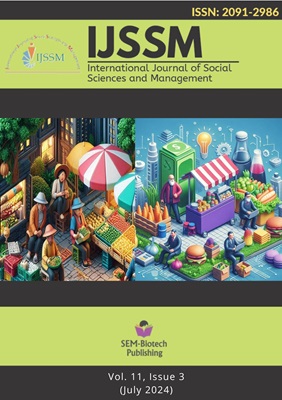Impact of Fundamental Factors on Share Price of Non-life Insurance Companies in Nepal
DOI:
https://doi.org/10.3126/ijssm.v11i3.68378Keywords:
Book Value Per Share, Dividend Per Share, Earning Per Share, Fundamental Factors, Price Earnings Ratio, Stock PriceAbstract
The aim of this research is to ascertain the direction in which fundamental factors impact Nepali non-life insurance businesses' stock values. This paper examines all twelve Nepal Stock Exchange (NEPSE)-listed non-life insurance companies using a quantitative, analytical, and descriptive research methodology. Nepal Rastra Bank, the Ministry of Finance and the insurance firms' websites served as secondary sources of information. The results has indicated that two significant elements affecting stock prices are the Price-to-Earnings (P/E) Ratio and Earnings Per Share (EPS). The Market Price of Shares (MPS) and EPS have the most positive association (r = 0.606, p < 0.01), whereas the P/E Ratio and EPS have the least positive correlation (r = 0.400, p = 0.003). Dividend per share (DPS) and MPS do not have a statistically significant link (B = 0.738, p = 0.854), whereas book value per share (BVS) and MPS have a marginally significant but positive correlation (B = 1.874, p = 0.061). The stock prices of the organizations in Nepal are significantly influenced by the EPS and P/E ratios. These findings suggest that higher P/E and EPS ratios are associated with better returns for investors. While DPS has minimal effect on stock prices, governments should make accurate and transparent financial reporting a priority to help investors. This paper analyzes the financial variables influencing the pricing of Nepalese non-life insurance stocks and offers advice on investment strategy and policy development.
Int. J. Soc. Sc. Manage. Vol. 11, Issue-3: 76-82.
Downloads
Downloads
Published
How to Cite
Issue
Section
License
Copyright (c) 2024 International Journal of Social Sciences and Management

This work is licensed under a Creative Commons Attribution-NonCommercial 4.0 International License.
This license enables reusers to distribute, remix, adapt, and build upon the material in any medium or format for noncommercial purposes only, and only so long as attribution is given to the creator.




